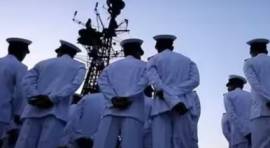Homeward bound : On the release of the eight former Indian naval personnel from Qatar
Quiet diplomacy without brinkmanship helped India’s case in Qatar
The release of all eight former Indian naval personnel from Qatar, just about three months after they were ordered a shocking death sentence, is a matter of great relief. Ever since the eight men — seven senior retired naval officers, and a sailor — who worked for the Qatar-based Dahra technologies, were arrested in 2022, the details of their case have been sparse . While their families denied reports that the men had been accused of espionage , possibly for a third country, namely Israel, the charges must have been serious enough to have invoked the death penalty. An appeals court did, in December, commute the death penalty to imprisonment terms, but upheld the conviction . It is to the government’s credit that it was able to bring-about the release of all the eight, seven of whom have now returned. The success seems attributable to the strategies New Delhi employed : to pursue the case in court, showing respect to the Qatari legal system, while providing the accused with full legal support and counsel; avoid all escalatory rhetoric and public sparring ; and, to take the case to the highest levels, with Prime Minister Narendra Modi discussing it with the Qatari Amir, Sheikh Tamim bin Hamad Al-Thani, during a meet in Dubai in December. That Mr. Modi announced an unscheduled leg of travel to Doha on Wednesday, after his ongoing trip to the United Arab Emirates, signifies his personal involvement and his desire to thank the Qatari Amir.
The Qatar case is a timely reminder of the importance of quiet diplomacy at a time of brinkmanship and geopolitical conflict, particularly when it comes to relationships where so much else is at stake . For India, Qatar is an important West Asian power, with increased heft during the Israel-Gaza conflict as an important interlocutor between the West and Hamas. For Qatar, ties with India are historic and dependable, consistent even when Qatar was boycotted by its Gulf neighbours some years ago. Qatar supplies India with a third of its natural gas import needs, and the signing of a $78 billion LNG deal last week may have been an early sign that the deal for the prisoners’ release had been sealed by then. More than 8,00,000 Indians provide important services to Qatar and bring in critical remittance earnings for India. New Delhi’s decision not to seek international intervention, as it did in the case of former naval commander Kulbhushan Jadhav, who has been convicted of espionage and terror charges in Pakistan, nor to counter Qatar’s charges with the kind of harsh diplomatic countermeasures seen in the aftermath of the Nijjar assassination case in Canada, eventually provided an outcome satisfactory for all.
